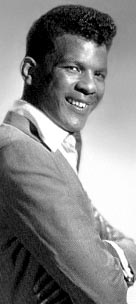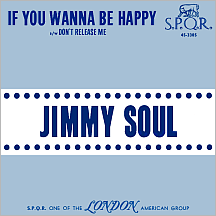JIMMY SOUL
If You Wanna Be Happy
Norfolk, Virginia's leading record man, Frank Guida, had been a fan of the music of the West Indies since he'd served military duty there during World War II. His own frustrating attempts to make it as a calypso-style singer in New York came to fruition much later when he began producing records for his own Legrand label, starting with the unusual multi-version "High School U.S.A." by Tommy Facenda, a hit in 1959 after Guida licensed the master (in 28 regional variations) to Atlantic Records. A year later he and Joe Royster wrote "New Orleans," the first of many hits for Gary (U.S.) Bonds, and the Legrand label was on the music industry radar with Guida's live-sounding, "hot" (another way of saying overmodulated) production style. Frank finally scratched his island itch when he adapted a pair of calypso tunes that turned out to be big hits for local singer Jimmy Soul. One concerned a femme fatale by the name of Matilda ('...she took all me money, never thought she would!') while the other offered a bit of debatable advice not unrelated to the first: 'Get an ugly girl to marry you!'
Jimmy was born James McCleese in New York in 1942, shortly before his churchgoing family moved to Weldon, North Carolina. At seven he displayed a knack for delivering a sermon, as comfortable behind the pulpit as most kids his age would be playing in a sandbox. Guida became aware of his singing talent around 1958, as the teenaged McCleese had been a member of several gospel groups in the area (his nickname: "The Wonder Boy"). In 1960 he followed an urge to sing and record secular music, resulting in a pair of 45s in '61 for the Marco label using his real name. McCleese composed both sides of the first single, "Tell Me Why" and "I Need Your Love," then Royster and Guida got involved as songwriters on the next disc; "A Million Tears" reveals more than a hint of calypso influence, a style James was not adverse to performing. The groundwork had been laid for future success.
Guida decided to do a "twist" update on calypso music trailblazer Norman Span's 1930s calypso song "Mathilda," which had been popularized several years earlier by Harry Belafonte (as "Matilda, Matilda!"). Bonds, his top star, passed on doing the song, retitled "Twistin' Matilda" with altered lyrics (she '...a-run to Las Vegas,' closer to home than the original's Venezuelan destination). McCleese wound up doing the session; the finished product featuring regular U.S. Bonds musicians has similarities to the horn-based ska music developing out of Jamaica at the time. Guida came up with a high-and-mighty name, rooted in his Italian heritage, for his latest record label: "S.P.Q.R." stands for "Senatus Populus Que Romanus," or more simply the senate and people of Rome. James became Jimmy Soul for this release, a name that had been used in church years earlier in reference to his passionate approach to preaching. It was a top 30 hit in May and June of 1962 and McCleese's new moniker was a keeper.
The next single, "When Matilda Comes Back" (more specifically '...comes a-twistin' on back') avoided sounding too much like its predecessor but failed to spark interest. "My Baby Loves to Bowl" dealt with his girlfriend's obsession with strikes and spares (what guy hasn't experienced that problem?); its flip side, a remake of Johnny Cash's 1958 hit "Guess Things Happen That Way," teamed Jimmy with an unidentified female duet singer in a version truly unimaginable to lesser minds than Guida's. These bizarre recordings were creative, to say the least. The next one achieved a level of popularity I don't believe anyone could have predicted.

"Marry an Ugly Woman" was recorded in 1934 for Meletone Records by its composer, Trinidad singer Hubert R. Charles (real name Hubert Rafael de Leon), also known as The Lion. Lyrics had an advisory tone: 'If you want to be happy and live a king's life...you'll never make a pretty woman your wife,' warning of the pitfalls of having an attractive spouse, insisting it made sense to 'always marry a woman uglier than you!' In 1957, the song was remade by actor-singer Robert Mitchum for his Capitol album Calypso - Is Like So... under the title "From a Logical Point of View." Jimmy Soul's retitled-and-reworked "If You Wanna Be Happy," despite a built-in potential to offend ('...though her face is ugly, her eyes don't match...take it from me, she's a better catch!'), instead delighted. Many seemed to zero in on the funny spoken banter between Jimmy and a member of vocal backing group The Rockmasters: 'I saw your wife the other day!...Yeah...Yeah, and she's uuuglyyy!!!...Yeah, she's ugly, but she sure can cook, baby!' End result? The record hit number one on the national charts in May 1963!
The challenge of building on a much-talked-about novelty smash like this proved insurmountable. Similar calypso-based themes didn't translate well to a U.S. society where equality for women was still in the process of being fully realized. Follow-up "Treat 'Em Tough" was catchy enough but took the subject matter a step too far, perhaps; it's a wonder it received any airplay at all, as lyrics like 'every now and then ya gotta get a little rough...' suggest abuse in relationships. After that misstep, "I Wish I Could Dance" appeared on 20th Century-Fox from an earlier recording session. Backed by a new version of The Chants' minor '61 hit "Respectable" (The Isley Brothers had the original), it was credited to Jimmy Soul and the Chants, though Jimmy doesn't sing on the track.
Sticking with the calypso formula for the most part, five more S.P.Q.R. singles came out through late 1964 including "Go 'Way, Christina" ('...she's four feet tall, four feet wide and ugly as a troll'); the tribal-based subject matter was either a little behind the curve or just plain over-the-top. Desperation was obvious by the time "My Girl - She Sure Can Cook" came out; the song bears more than a passing resemblance to U.S. Bonds' "Dear Lady Twist." After his career hit the skids, Jimmy Soul joined the Army. Later he developed a serious drug habit and died of a heart attack in 1988 at age 45. In all the years since 1963, the infamous anti-pretty-woman hit "If You Wanna Be Happy" has teeter-tottered between acceptability and condemnation based on the prevailing social attitudes of any given period. It's uncertain as to whether Jimmy ever took the advice contained in its lyrics.


